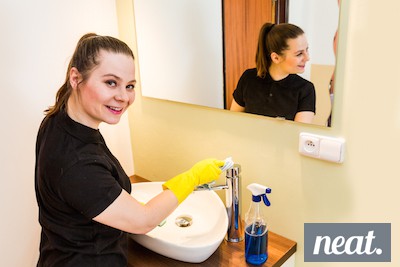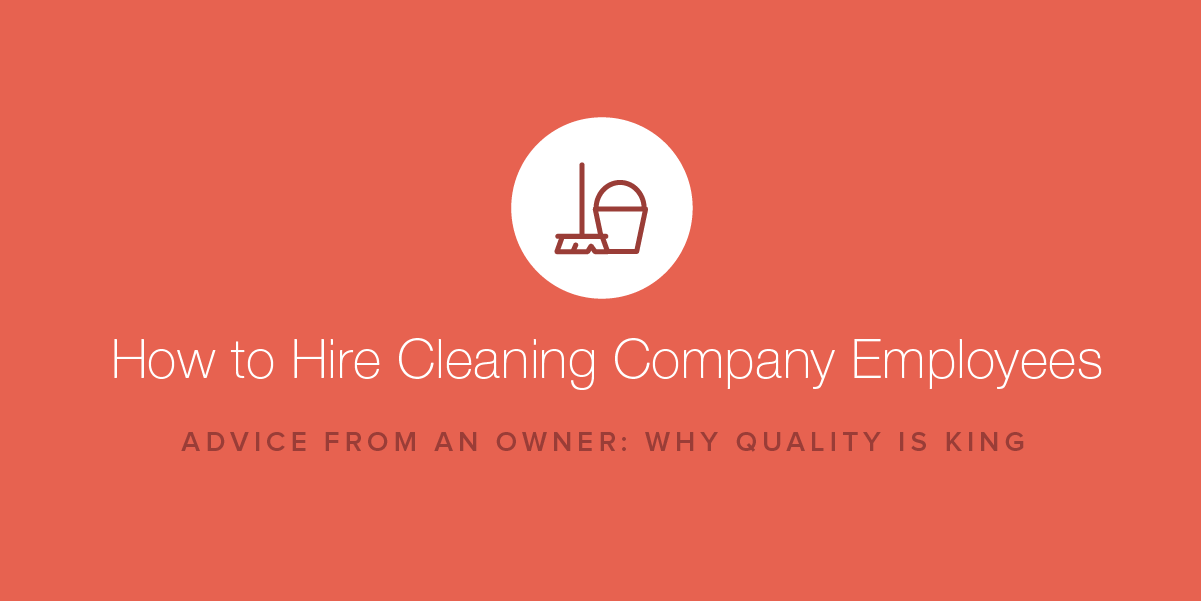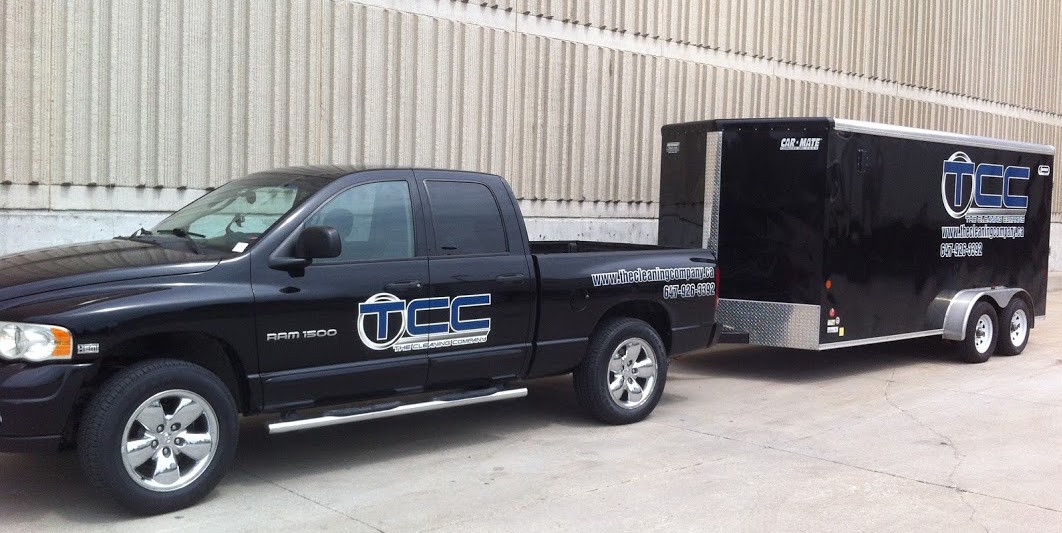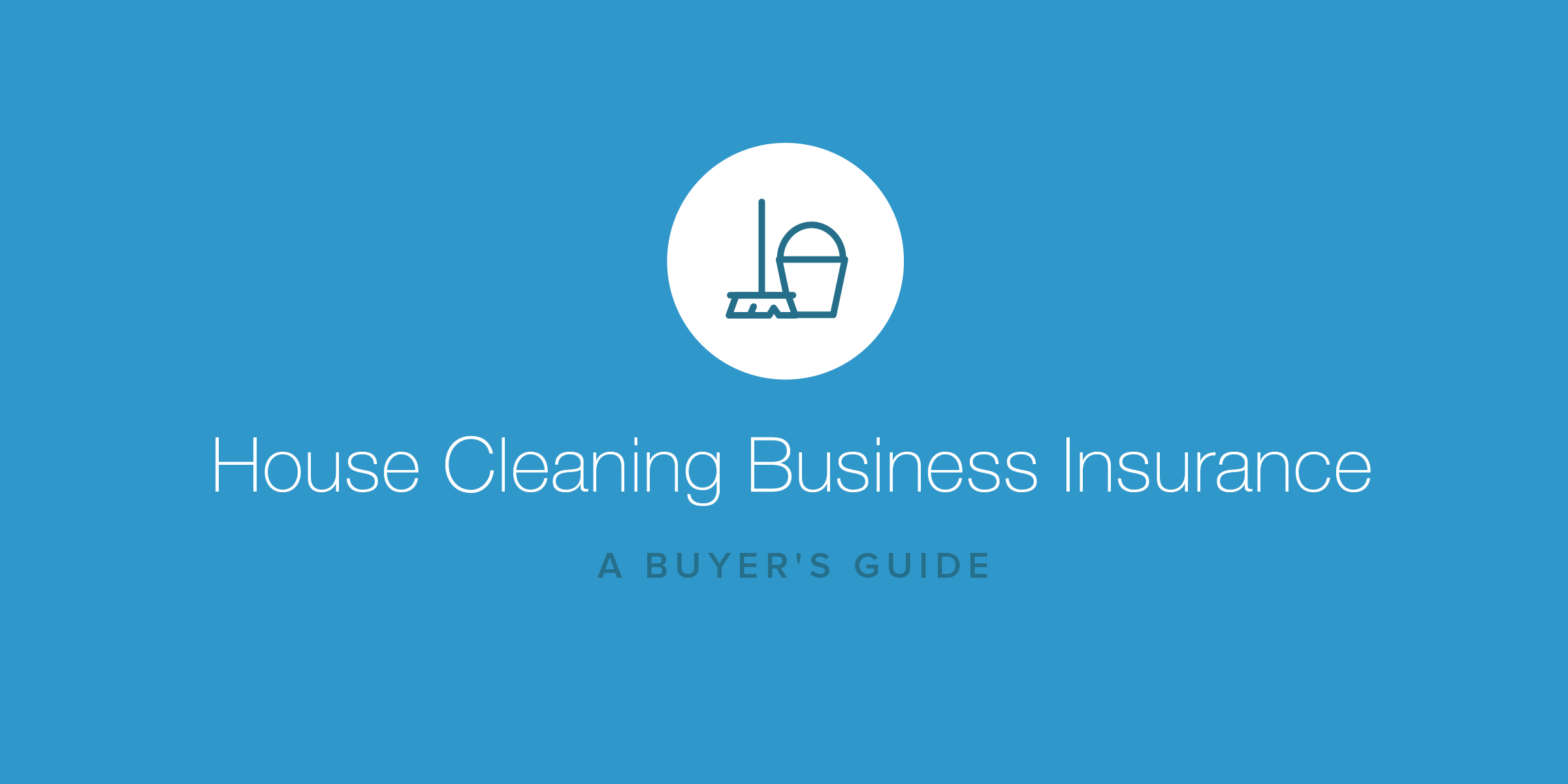How to Hire Cleaning Company Employees: Why Quality is King
- July 17, 2019
- By: Vonigo
Running a cleaning company is tough. The issue isn’t finding clients. Finding clients is the easy part. Hiring cleaning company employees is far more difficult than marketing a cleaning company. The much greater challenge is finding and growing a high-quality workforce.

Finding great people is repeatedly flagged as one of the most difficult parts of running and growing a successful cleaning company. It wasn’t until I set up Neat – a premium house cleaning company — that I realized just how true this was. Once we learned how to hire great cleaning company employees, our company was able to thrive. Today our team of 25 cleaners services over 150 regular clients every week.
‘Clients do not come first. Employees come first. If you take care of your employees, they will take care of the clients.’
—Richard Branson, Founder at Virgin Group
Sub 2% Recruitment Rate
In June of 2019, we received 694 cleaner job applications and made just 28 job offers. This equates to a 4% recruitment rate. Typically, less than 50% of all new joiners will pass our one-month trial.
In an average month, we’d expect to add less than 2% of all applicants to our team of cleaning company employees. Over the long-term, we actually hover closer to the 1% level.

Attitude and Professionalism Trump Everything When Hiring Cleaning Company Employees
In the cleaning industry, attitude and professionalism are the most important things to identify in a candidate. Someone with 10 years of 5-star hotel cleaning experience but a poor attitude will likely not work out. It doesn’t matter how experienced a cleaner is if they’re continually turning up late or not at all.
Our multi-step recruitment process aims to test these character traits at each stage to help us hire the very best cleaning company employees. We filter out unsuitable candidates with as little time invested as possible.
Building a Scalable Recruitment Funnel
If we were to individually go through the almost 700 resumes we receive per month, shortlist them, and individually contact them for interviews, the time and cost burden would be huge.
Instead, our approach is to use technology and automation until we’ve identified candidates that could be a good fit. Only at this stage do we then begin to invest time and resources into interviewing and on-boarding.

Where to Source Great Candidates?
We source candidates from a variety of job websites. We currently use (or have used) all of the following: Indeed, Facebook, Monster, Reed, Total Jobs, Adzuna, Job Today. Referrals from your current cleaners are also extremely effective. We give out bonuses each time a new cleaner is referred to us. It’s important to continually test your recruitment channels as performance can vary over time.
As you scale, you’ll need to track candidates from their specific source. The majority of online job boards allow you to send candidates to the job page on your website. Use Google UTM tags to append to your web page URLs to help you differentiate the different candidate sources.
Look at both the volume of applications you get and quality (we define this in terms of job offers made).

Our 7-step Recruitment Process to Hire Great Cleaning Company Employees
As attitude and professionalism are the core facets we look for in new hires, our process puts the onus on the candidate. How do they answer interview questions? Do they call at the correct time for their telephone interview? Do they even call at all? How long do they take to respond to a job offer?
We use all these questions and many more to identify whether a candidate is the right fit for our organization. A poor hire can potentially cause far greater headaches in the future, so we need to ensure we only take on the very best.
- Online Application Form: Given the volume of applications we receive, we don’t individually review applications, but direct them all to our online job application form. There we ask questions around their experience and to confirm they’re happy with the requirements of the jobs. For example, we require our cleaners to travel within certain areas for jobs so those that only want to work locally wouldn’t fit with us. We use a software called Typeform that allows us to redirect candidates to different “Thank You” pages after they submit their applications based on the answers they’ve given. To automatically shortlist a candidate, define how you would like a successful candidate to answer your questions, and then based on those conditions you can send them to a different page. With our form, we automatically shortlist around 30% of applicants.
- Self-Schedule Interviewing: Once a candidate has been shortlisted, we use another software called Calendly to embed some code on that webpage, and this allows them to book in a specific time slot for a telephone interview. Again this allows us to save significant time, and avoids the back-and-forth emails trying to find a suitable time for a call. Once a candidate books a time, they’re emailed a confirmation and send a 24-hour reminder. Again all this happens automatically without a single minute of our time.
- Telephone Interview: The cleaning industry is notorious for candidates not turning up for interviews. This can be a huge waste of time for employers so we use a couple of tricks to minimize this. First, we ask candidates to call us rather than us calling them. Incredibly, just 20% of candidates who book a telephone interview will call us. Whether they forget or choose not to call is not entirely clear. By putting the onus on the candidate, we avoid wasted time making calls that don’t connect. If a candidate calls us at the correct time, then we’re pretty sure they’re keen to find out more about the job and they can follow instructions – an important part of the job! Secondly, given that just 1 in 5 candidates actually call, we “quintuple” book each time slot. Thus an 11 am telephone interview slot will actually have up to 5 candidates booked for the same time. So on average, we would expect 1 call to be made. Again this saves us time waiting around. And even if 2 calls are received at the same time, we can call back the 2nd candidate shortly after. This is generally not a problem but is a huge time saver for us.
- Job Offer: In a tight labor market, once you find a great candidate you need to move quickly. In 99% of the cases, we know at the end of the interview whether we want to offer them a position. If we do, we tell them there and then, and tell them what happens next. Usually, this involves us emailing them a contract as well as a request to undergo an ID check. Around 30% of those candidates we speak to are offered a position.
- Response to Job Offer: You’d think that once an offer was made that our work would be done! However, we still continue to test the candidate before onboarding them. We explicitly tell them that they need to sign the contracts and send over copies of their ID within 24-hours. If a candidate doesn’t hit this timeline, then again this is a red flag for us. Either this is an issue in following instructions, not having the relevant documents, or their willingness to accept the job. In any case, this is our cue to move on to the next candidate.
- 1-month Trial: As a new hire, you’re nearly there now! You started your first job but now you need to pass your 1-month trial. At the end of a new hire’s first month, we again look carefully at professionalism and attitude as well as client ratings. Are they punctual for jobs? Have they taken any sick days? What is their general attitude to feedback? Often we’ll find that less than 50% of new joiners make it through this trial.
It’s About the Value, Not the Cost
You’re probably thinking that this process seems overly long-winded and complicated simply to hire a new cleaning company employee. And in a way you’re correct.
Our focus, however, is on building a high-quality service, one which is high priced relative to other competitors. Therefore our service is one that requires the quality of service to justify the price premium.
Once you’ve found the best cleaners, they tend to stay for a long time, refer other great cleaners to us and, interestingly, help significantly in marketing.

Your Workforce as a Marketing Channel
As well as doing the work, your cleaners are actually a key part of your marketing strategy. If you have a great cleaner, you tell your friends. Word-of-mouth marketing is one of the most powerful client acquisition channels out there.
At Neat, around 15% of our new clients come from referrals. So the better your workforce, the more cost-effective your marketing. And in addition, a client lead from a referral is far more likely to convert than a cold lead that has never heard of your company before.
The Recruitment Challenge
I say it often: We believe that recruitment is actually more difficult than client marketing in our industry. However, that’s not to say that we don’t invest in client marketing. We do and will continue to spend many thousands per month on both online and offline marketing channels. However, we see recruitment and marketing as two sides of a seesaw — both which require constant investment, analytics, and testing.
Just as we do for client marketing, we constantly test new recruitment channels be it online or offline. We test different ad copy, different pay scales. We even test different interview formats. So, for example, we’re currently testing whether telephone interviewing can be as effective as face-to-face. We’re constantly testing everything. If you neglect either one of these two channels, this will eventually suffocate your growth.
I do hope this is helpful. I’d be delighted to hear your feedback or to answer any questions you have. Feel free to contact me directly at sean.parry@neatservices.co.uk or via our website at www.neatservices.co.uk.
Sean Parry is the Founder of Neat Services, a house cleaning company in London, UK that cleans hundreds of homes every week.Want to learn about how cleaning company software can help you manage and grow your business? Book a free, private demo of Vonigo.



